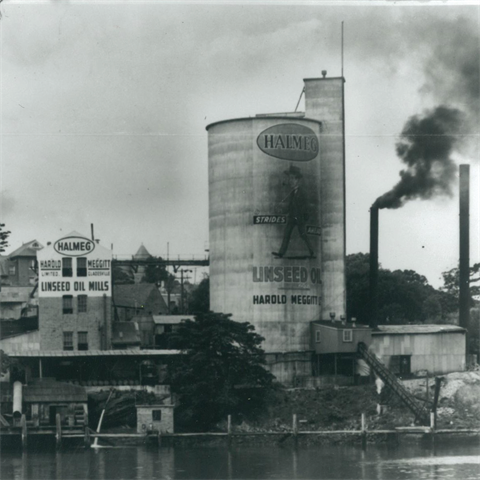11. Banjo Paterson Park

In 1922, this land was held by Harold Meggitt (1881-1949) who operated a vegetable oil extraction plant (Halmeg), producing linseed oil for industrial uses (mainly paint), oil cake for cattle fodder, later safflower, sunflower and canola oil for the edible oil industry. Harold Meggitt was a pioneer employer in establishing a profit-sharing scheme with his employees. When the factory closed in 1974 the site was proposed for construction of 174 townhouses.
Agitation from the local community encouraged the State Government and Ryde Municipal Council to acquire the land and create a waterfront park in 1978. The factory was demolished but the company office was retained and later restored.
Banjo Paterson Park, with views to Looking Glass Bay and the Parramatta River, is an attractive riverside parkland retaining some of the natural shoreline which is an uncommon feature along the river. The concrete base of the site is in the shape of an Aboriginal rock engraving of a whale and the plaque is mounted on bricks from Vernals Farm in Hampshire, once the home of Governor Phillip.
In the garden beds on the north side of Rockend a flagpole marks one of Ryde’s lesser-known memorials.
Engraved on a sandstone outcrop under a large fig tree just past the end of Punt Road are the initials, A.K., and the words, DE MORTIOUS (sic) NIL NISI BONUM which translate as ‘Of the dead nothing but good is to be said.’ Adjacent to this are the Roman numerals XVII.X1. (sic). Many people have puzzled over this inscription and the numerals are often taken to be a date, alternatively it may be a Bible reference to John 17:11. On the vertical face of the same rock another, but perhaps more weathered inscription, refers to the death of someone who apparently only lived for four years. It remains a mystery.
Location
Punt Road, Gladesville 2111 View Map
-33.83933157, 151.1276373
Punt Road ,
Gladesville 2111
Punt Road ,
Gladesville 2111
11. Banjo Paterson Park